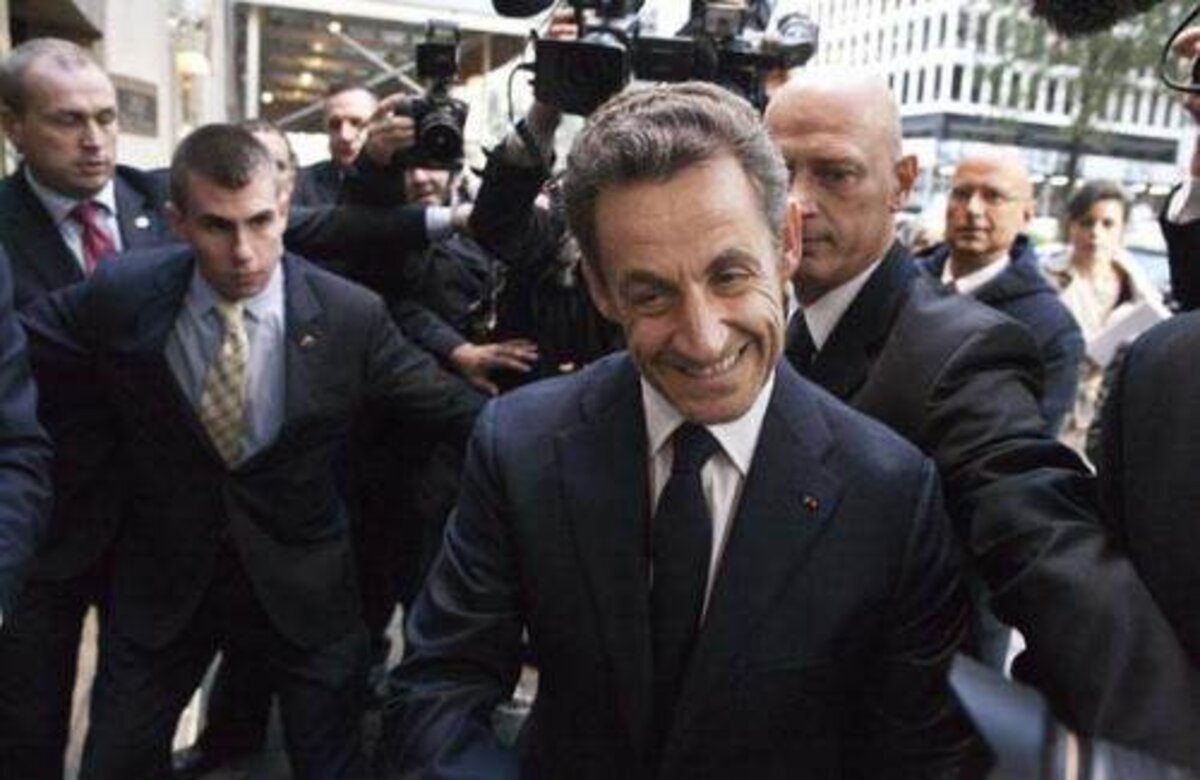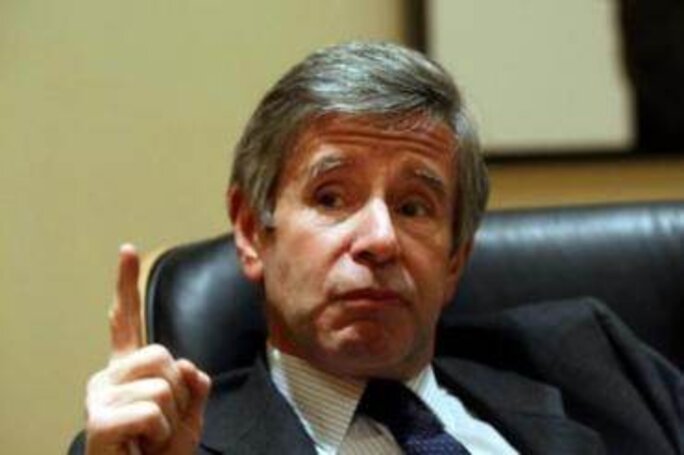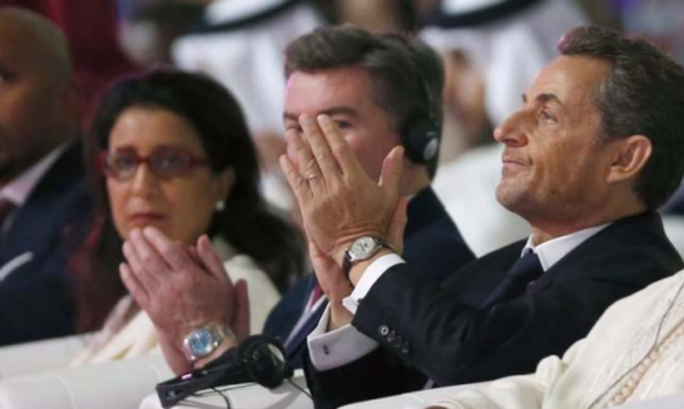Former French President Nicolas Sarkozy is secretly attempting to set up a 1 billion-euro private equity fund, with plans for it to be based in London, and has begun prospecting wealthy individuals and institutions to back the scheme, financial and business sources have told Mediapart.
Several sources have provided Mediapart with detailed and concordant accounts of how the conservative politician, who lost his re-election bid in May last year, has made discreet contact with potential backers based in France, the Middle East and South-East Asia. Some of the meetings and confidential contact-making have been held on the sidelines of a series of worldwide, highly-paid conference speeches he began giving last autumn.
Mediapart has obtained confirmation from several sources that a number of leading business figures in France have been invited to invest in the scheme, notably Vincent Bolloré, a close friend of the former president. Another friend of Sarkozy’s, the French Canadian billionaire financier Paul Desmarais, was also approached.

Meanwhile, as the exploratory contacts to raise the financing of the scheme continue, no company has yet been registered and Mediapart has been told that Sarkozy, who turns 58 on January 28th, has not yet reached a final decision to proceed with the project.
While Sarkozy’s aides have offered vague dismissals of Mediapart’s report – a spokeswoman for the former president telling The Times he “denies Mediapart’s article” - they have not specifically commented on either his plans to create the equity fund or the intention to base it in London. During the preparation of Mediapart’s report, first published earlier this week in French, Sarkozy’s lawyer Thierry Herzog declined to reply to Mediapart’s invitation to comment on the information published here.

Sarkozy’s key ally in his efforts to establish the private equity fund is Alain Minc, 63, a businessman and business advisor, who also served as a political advisor to Sarkozy when he was president. Minc did not return Mediapart’s invitation to comment on its information before the original article in French was published. However, after publication, he told French daily Le Figaro: “Nicolas Sarkozy doesn’t need me to meet with the world’s largest funds [sic],” adding that “he has a thousand contacts and hasn’t decided what he will do.” Minc said any suggestion that Sarkozy could become a tax exile in London was “absurd”. However, Mediapart’s report in fact cited London as the planned base for the private equity fund.
Mediapart has learnt that early details of Sarkozy’s private equity fund plan were discovered by the French police’s financial crime squad after a series of searches of his offices and home carried out last July 3rd. The police raided the premises as part of an ongoing judicial investigation into the suspected illegal financing of his 2007 election campaign by l’Oréal heiress Liliane Bettencourt. According to Mediapart sources, they later found mention of the equity fund project on computer files they seized.
During his five-year presidential term, Sarkozy, who is also a qualified lawyer, had repeatedly told those close to him that in the future he wanted to pursue a business career. Even before he became president, he had also made his ambition known in public, in an official ceremony on October 23rd 2006. Sarkozy, then interior minister, was delivering the Légion d’honneur, France’s highest order of civil merit, to his friend Stéphane Richard, the current CEO of France Télécom, a successful businessman who was notably a former head of the Nexity bank and one-time chief-of-staff to French finance minister – now IMF chief - Christine Lagarde. “You are rich, you have a lovely house,” Sarkozy told Richard. “You have made a fortune. Perhaps I will later manage to get there myself. It is the France I love,” he continued, later adding: “One day, I’ll do like you.”
Closed-doors tours
Sarkozy began his conference tours last autumn with a closed-door gathering of clients of the Brazilian business bank BTG Pactual, held at the New York Waldorf Astoria hotel on October 11th 2012. The BTG bank – abbreviated from Banking and Trading Group – specializes, among other activities, in private equity funding.
Shortly after, on October 22nd, Sarkozy travelled to the Brazilian city of Sao Paulo where, during a two-day stay, he met with Brazilian President Dilma Rousseff. But the reason for his visit was another closed-door conference meeting with a group of business figures, again organised by BTG Pactual.
In early November 2012, Sarkozy travelled to Singapore where he gave a conference speech on the international economic situation to an audience of bankers and business figures, and which was once again held behind closed doors.

On November 13th he was in Moscow with his wife, Carla Bruni-Sarkozy, to appear as guest of honour at a ceremony of awards for “excellence” in investments made in Russia, organised by the Alfa Group of Russian billionaire businessman Mikhail Maratovich Fridman, together with Oxford University’s Said Business School. As reported at the time in French weekly news magazine L’Express , citing Russian daily Izvestia, “Mikhail Fridman is [reportedly] seeking to bolster his [relations] abroad in order to develop his business dealings”.
The guest of honour at the ceremony the previous year was former British Prime Minister Gordon Brown, who was paid £61,000 for attending the event.
On December 11th 2012, Sarkozy travelled to Doha, the capital city of Qatar, where he participated in a conference about economic interests in sport and which was organised by events producer Richard Attias, husband of Sarkozy’s former wife Cécilia.
Mediapart has learnt that during his trip to Singapore last November, Sarkozy approached the management of Temasek, one of the country’s two sovereign wealth funds, together with the Government of Singapore Investment Corporation. Temasek, which is owned by the Monetary Authorithy of Singapore, manages long-term investment of the state’s reserves, and specializes in private equity, with some 25% of its investments placed outside of South-East Asia.
Conflicts of interest
According to Mediapart’s sources, Sarkozy proposed that Temasek place 200 million euros in his planned equity fund, and suggested that the United Arab Emirates might also enter the project with the same amount. Mediapart understands that Temasek directors expressed doubts that Sarkozy could raise such amounts without placing his own money in the project, and that the talks ended without any agreement reached.
Sarkozy’s efforts to mount the private equity fund raise a major question of conflicts of interest. During his presidential term, from 2007 to 2012, he was closely involved in business dealings, both at home and abroad. A number of his political decisions benefitted his wealthy friends, such as Paul Desmarais with the privatization of Gaz de France (GDF). Under French criminal law, very strict rules apply to civil servants that prohibit, once they have left public service, activities that reveal a conflict of interest with their former duties. It would be highly questionable that such requirements did not also apply to a former president.
Meanwhile, it is unclear whether the choice for the fund to be based in London, which is indicated in the early plans for the project to which Mediapart has gained access, is for tax reasons or because the City is the most appropriate financial centre for a private equity fund. Whatever the reasons, if the scheme goes ahead it would cause a political storm far greater than that which surrounded actor Gérard Dépardieu’s tax exile move to Belgium.
There is also the question of what Sarkozy’s official role in the fund, if created, might be. It would be a decisive choice regarding any future active role he may hope to play in French politics, about which he has maintained a discreet silence since leaving office.
- This article is an abridged and updated version of Laurent Mauduit's investigation originally published in French and available by clicking here.
-------------------------
English version: Graham Tearse


